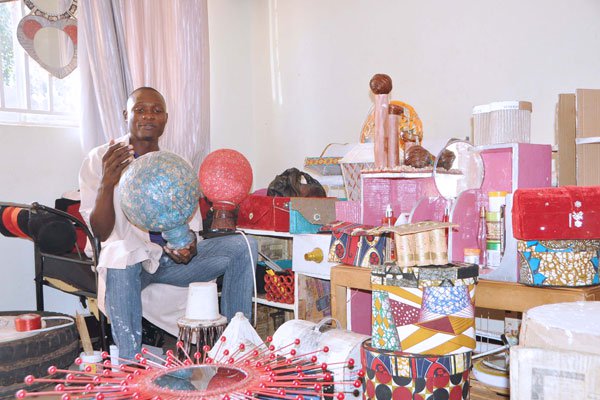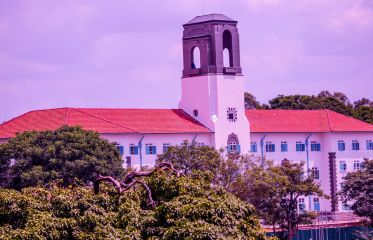Breaking News
- Flexible Remote Work Opportunity for University Students: Earn $100–$250 Per Month ...Read More
- Ministry of Education and Sports Azerbaijan Government Scholarships For 2025-2026 Academic Year ...Read More
- Government Sponsorship Undergraduate Admission Lists 2025-26 for Makerere University ...Read More
- Ministry of Education And Sports: Egyptian Government Scholarships 2025-2026 Academic Year ...Read More
- Ground Breaker Full Scholarship for girls to study Software Engineering 2025 July Intake ...Read More
- Tony Elumelu Foundation Entrepreneurship Programme (TEEP) 2025 for young African Entrepreneurs ...Read More
- DESIGNING FUTURES 2050 International Design Competition 2025 (€15,000 prize) ...Read More
- Ground Breaker Full time Scholarship for girls to study Software Engineering 2025 Intake ...Read More
- Ministry of Education And Sports Algerian Vocational Training Scholarships for 2024-2025 AY ...Read More
- Ministry of Education and Sports Advert for the Algerian Government Scholarships for 2024-2025 ...Read More
Senior Four leaver takes on crafts business from waste

Mr Michael Isaac Kuteesa, founder La Craft Uganda shows a lamp shade made from waste materials. Currently, production remains confined to his sitting room in Manyangwa. Photo by Eronie Kamukama monitor.co.uug
In the village of Manyangwa, Wakiso district, a crafts business is in bloom. Mr Michael Isaac Kuteesa, the founder of La Craft Uganda, refuses plastic to go to waste. He does not want to see Uganda’s environment getting polluted further.
Starting
In 2014, without any training in industrial art and design, Mr Kuteesa wrapped his mind around the idea of making plastic bottles but it took him two years to produce the first product.
“I was running both my businesses including events management and graphic designing. They are still running although producing crafts from plastic waste takes up most of my time. After doing research on what we could make, we started off with chairs, then earrings and necklaces,” Mr Kuteesa says.
Diversifying products
Producing quality items did not come easy. It involved a lot of trial and error as there was no one to learn from.
With time, the Senior Four leaver noticed he could also make crafts from old clothes, cuttings from cloths, car tyres, serviettes, toilet paper and newspapers. Instead of mainstream media, Mr Kuteesa opted to advertise his products on social media and it has been working for close to three years now.
“The next products were starburst mirrors and when I posted them on Facebook, we got orders. It is at that point that I realised I could get money from what I am doing with waste materials,” Mr Kuteesa says.
Over the years, he has also turned to exhibitions, marketing the crafts and hoping to bring more people into the trade
“I desire to have 1 million people who can make crafts out of waste because these are handmade crafts that can go onto the world market. They can be tested as standard,” he says.
Employment
Putting his desire in action, he is training groups in Wakiso and Kamuli districts to provide the much-needed support to such crafts businesses. He is also getting to families and schools in communities to inspire waste recycling.
“La Craft is bringing in the money but very little because we would not like to widen the market when we are unable to produce enough. The market we get now is from individuals who love the products. We cannot search for orders in big markets,” Mr Kuteesa says.
The groups are still in their infancy and La Craft only has four workers. Production remains confined to his sitting room in Manyangwa.
The product range, on the other hand, has grown to include vertical gardens, wall hangings, lamp shades, tables, chandeliers, bags, storage boxes, shoe racks, book shelves, flower vases, trees among other things.
Making this alternative route for production comes at a cost difficult to sustain, even with prices of items going up to Shs800,000.
“This training is not supported so we have to go into our pockets, it is spending money when we know we shall not get it back quickly,” he says.
In search of funders
La Craft is now choosing to look for funders especially companies that use plastics in their production processes and environmental organisations. By 2017, Coca Cola Uganda reported collecting 300,000 metric tonnes of plastic waste from within and around Kampala to feed its recycling plant. That was just 18 per cent of all the waste.
About 34 per cent was reported to be handled by other companies while 50 per cent of Kampala’s plastic waste was unaccounted for.
Plans
Today, La Craft makes a minimum of Shs800,000 a month. This figure could get better than it is today given the production targets the business has set for itself.
“I have a dream of setting up a supermarket-like structure for crafts made out of waste and clay so that local and foreign people can tour but also buy. If this is set up, it can earn me a lot of money,” Mr Kuteesa says.
With Uganda as host to the main crafts store, the dream is to have smaller crafts distribution points in other African countries.
Advice to business people
While Mr Kuteesa has taught himself everything he knows in business, he would have loved to get more knowledge from a school. Acquiring training in business administration helps, he says, though one can also network with those with essential skills. “I took long to write documents for my organisation because I tried but could not bring out what I wanted on paper. People who can do it will ask for Shs3m to Shs5m which you do not have yet you need a business plan,” Mr Kuteesa says.
Source * https://www.monitor.co.ug
Top Courses Currently Admitting
-
Diploma in Hotel Management and Catering
Nkumba University
-
Bachelor Of Tourism & Hospitality Management
Uganda Christian University
-
Bachelor of Science in Sustainable Agriculture and Extension
Ndejje University
-
Bachelor of Science Horticulture
Makerere University
-
Bachelor of Science in Conservation Biology
Makerere University






























